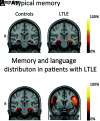Testing an Adapted Auditory Verbal Learning Test Paradigm for fMRI to Lateralize Verbal Memory in Patients with Epilepsy
- PMID: 36137657
- PMCID: PMC9575519
- DOI: 10.3174/ajnr.A7622
Testing an Adapted Auditory Verbal Learning Test Paradigm for fMRI to Lateralize Verbal Memory in Patients with Epilepsy
Abstract
Background and purpose: fMRI is a noninvasive tool for predicting postsurgical deficits in candidates with pharmacoresistant temporal lobe epilepsy. We aimed to test an adapted paradigm of the Rey Auditory Verbal Learning Test to evaluate differences in memory laterality indexes between patients and healthy controls and its association with neuropsychological scores.
Materials and methods: We performed a prospective study of 50 patients with temporal lobe epilepsy and 22 healthy controls. Participants underwent a block design language and memory fMRI. Laterality indexes and the hippocampal anterior-posterior index were calculated. Language and memory lateralization was organized into typical and atypical on the basis of laterality indexes. A neuropsychological assessment was performed with a median time from fMRI of 8 months and was compared with fMRI performance.
Results: We studied 40 patients with left temporal lobe epilepsy and 10 with right temporal lobe epilepsy. Typical language occurred in 65.3% of patients and 90.9% of healthy controls (P = .04). The memory fMRI laterality index was obtained in all healthy controls and 92% of patients. The verbal memory laterality index was bilateral (24.3%) more frequently than the language laterality index (7.69%) in patients with left temporal lobe epilepsy. Atypical verbal memory was greater in patients with left temporal lobe epilepsy (56.8%) than in healthy controls (36.4%), and the proportion of bilateral laterality indexes (53.3%) was larger than right laterality indexes (46.7%). Atypical verbal memory might be associated with higher cognitive scores in patients. No relevant differences were seen in the hippocampal anterior-posterior index according to memory impairment.
Conclusions: The adapted Rey Auditory Verbal Learning Test paradigm fMRI might support verbal memory lateralization. Temporal lobe epilepsy laterality influences hippocampal memory laterality indexes. Left temporal lobe epilepsy has shown a higher proportion of atypical verbal memory compared with language, potentially to memory functional reorganization.
© 2022 by American Journal of Neuroradiology.
Figures



